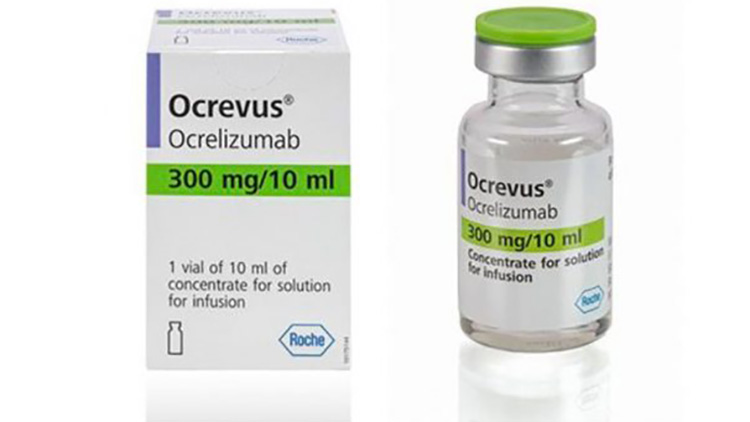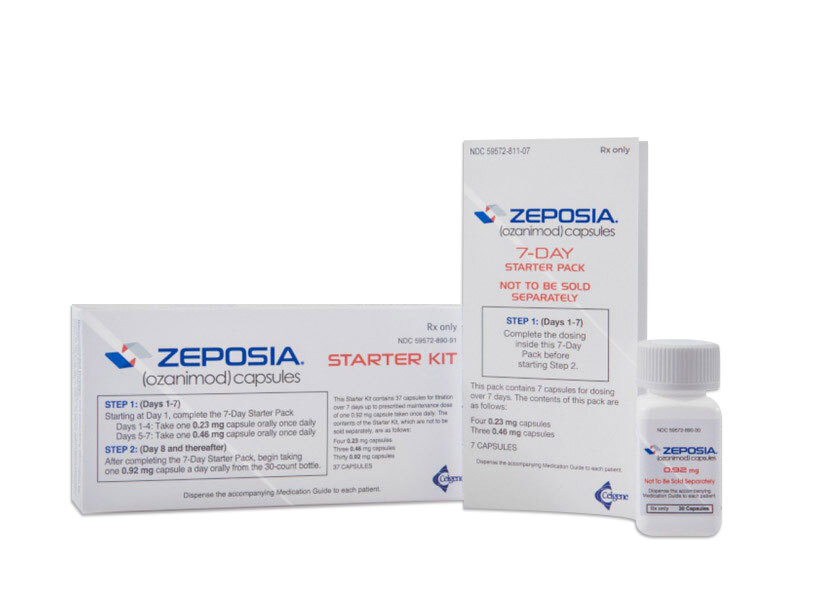Ocrevus (ocrelizumab) vs Zeposia (ozanimod)
Ocrevus (ocrelizumab) vs Zeposia (ozanimod)
Ocrevus (ocrelizumab) is a monoclonal antibody that targets CD20-positive B cells, which are thought to play a role in the pathogenesis of multiple sclerosis (MS); it is administered via intravenous infusion and is approved for both relapsing-remitting and primary progressive forms of MS. Zeposia (ozanimod) is a sphingosine 1-phosphate receptor modulator taken orally, which traps immune cells in lymph nodes, reducing their ability to contribute to nerve damage; it is approved for the treatment of relapsing forms of MS, including clinically isolated syndrome, relapsing-remitting disease, and active secondary progressive disease. When deciding between the two, considerations include mode of administration, the specific type of MS being treated, and individual patient factors such as comorbidities and preference for treatment regimen.
Difference between Ocrevus and Zeposia
| Metric | Ocrevus (ocrelizumab) | Zeposia (ozanimod) |
|---|---|---|
| Generic name | Ocrelizumab | Ozanimod |
| Indications | Primary Progressive Multiple Sclerosis (PPMS), Relapsing-Remitting Multiple Sclerosis (RRMS) | Relapsing forms of Multiple Sclerosis (MS), Ulcerative Colitis |
| Mechanism of action | CD20-directed cytolytic antibody | Sphingosine 1-phosphate receptor modulator |
| Brand names | Ocrevus | Zeposia |
| Administrative route | Intravenous infusion | Oral |
| Side effects | Infusion reactions, infections, skin cancer, depression, pain | Upper respiratory infection, liver enzyme elevation, hypertension, urinary tract infection, back pain |
| Contraindications | Active hepatitis B infection, history of life-threatening infusion reaction to ocrelizumab | Recent (last 6 months) myocardial infarction, unstable angina, stroke, transient ischemic attack, decompensated heart failure requiring hospitalization, Class III/IV heart failure, Mobitz type II second or third-degree atrioventricular block, sick sinus syndrome, sinoatrial heart block, active infection, immunocompromised state |
| Drug class | Monoclonal antibody | Sphingosine 1-phosphate receptor modulator |
| Manufacturer | Genentech (Roche) | Bristol Myers Squibb |
Efficacy
Ocrevus (Ocrelizumab) Efficacy in Multiple Sclerosis
Ocrevus (ocrelizumab) is a monoclonal antibody designed to selectively target CD20-positive B cells, which are believed to play a key role in the pathogenesis of multiple sclerosis (MS). The efficacy of Ocrevus in treating MS has been demonstrated in several key clinical trials, including the OPERA I and II studies for relapsing forms of MS, and the ORATORIO study for primary progressive MS (PPMS). In these trials, Ocrevus has shown to reduce the annual relapse rate, delay the progression of disability, and decrease the number of lesions on MRI scans compared to the control groups.
For relapsing MS, the OPERA studies showed that Ocrevus reduced the annual relapse rate by nearly 50% compared to interferon beta-1a, a commonly used MS therapy. Moreover, the proportion of patients who experienced disability progression was significantly lower in the Ocrevus group. In the ORATORIO study, which focused on PPMS, Ocrevus became the first therapy to demonstrate efficacy in slowing disease progression in this form of MS, which previously had no approved treatments.
Zeposia (Ozanimod) Efficacy in Multiple Sclerosis
Zeposia (ozanimod) is an oral sphingosine 1-phosphate receptor modulator that traps immune cells in lymph nodes, preventing them from entering the central nervous system where they could cause damage to nerve cells. The efficacy of Zeposia in treating relapsing forms of MS, including clinically isolated syndrome, relapsing-remitting MS, and active secondary progressive MS, has been established in the SUNBEAM and RADIANCE Part B clinical trials. In these studies, Zeposia demonstrated a significant reduction in annual relapse rates and MRI lesion activity compared to interferon beta-1a.
In the SUNBEAM trial, Zeposia reduced the annual relapse rate by approximately 48% over one year compared to interferon beta-1a. The RADIANCE Part B study showed similar results over a two-year period. Additionally, Zeposia was associated with a reduction in the number of new or enlarging T2 MRI lesions and the number of gadolinium-enhancing lesions. These findings support the efficacy of Zeposia as a treatment option for patients with relapsing forms of MS, offering the convenience of an oral medication with a favorable efficacy profile.
Regulatory Agency Approvals
Ocrevus
-
European Medical Agency (EMA), European Union

-
Food and Drug Administration (FDA), USA

-
Health Canada

-
Therapeutic Goods Administration (TGA), Australia

-
Medsafe (NZ)

Zeposia
-
European Medical Agency (EMA), European Union

-
Food and Drug Administration (FDA), USA

-
Health Canada

-
Therapeutic Goods Administration (TGA), Australia

Access Ocrevus or Zeposia today
If Ocrevus or Zeposia are not approved or available in your country (e.g. due to supply issues), you can access them via Everyone.org.
How it works

Make an enquiry
Choose the medicine you want to buy, answer a couple of questions, and upload your prescription to speed things up. We’ll get back to you within 24 hours.


Make an enquiry
Choose the medicine you want to buy, answer a couple of questions, and upload your prescription to speed things up. We’ll get back to you within 24 hours.


Breeze through the paperwork
We'll guide you through the required documents for importing unapproved medicine, ensuring you have all the necessary information.


Get a personalized quote
We’ll prepare a quote for you, including medicine costs and any shipping, administrative, or import fees that may apply.


Receive your medicine
Accept the quote and we’ll handle the rest - sourcing and safely delivering your medicine.

Some text on this page has been automatically generated. Speak to your physician before you start a new treatment or medication.
Let's talk
If you have any questions, call us or send us a message through WhatsApp or email:
Contact us




